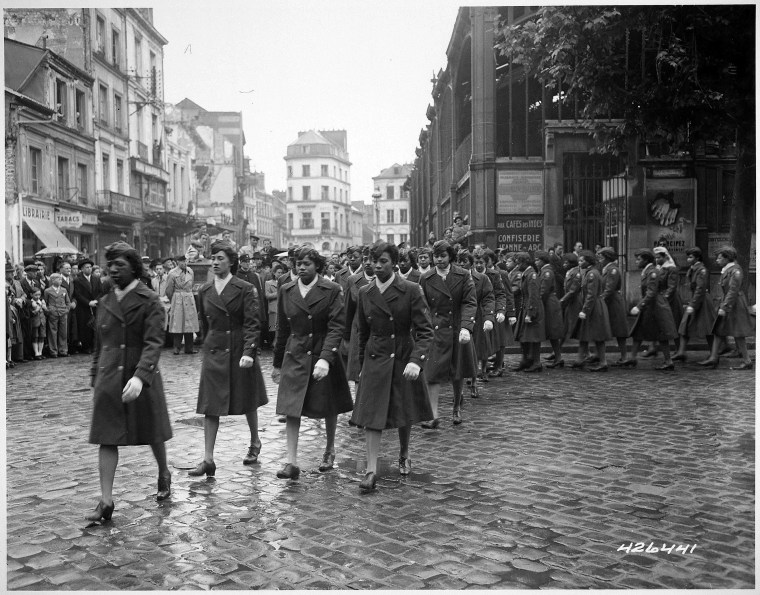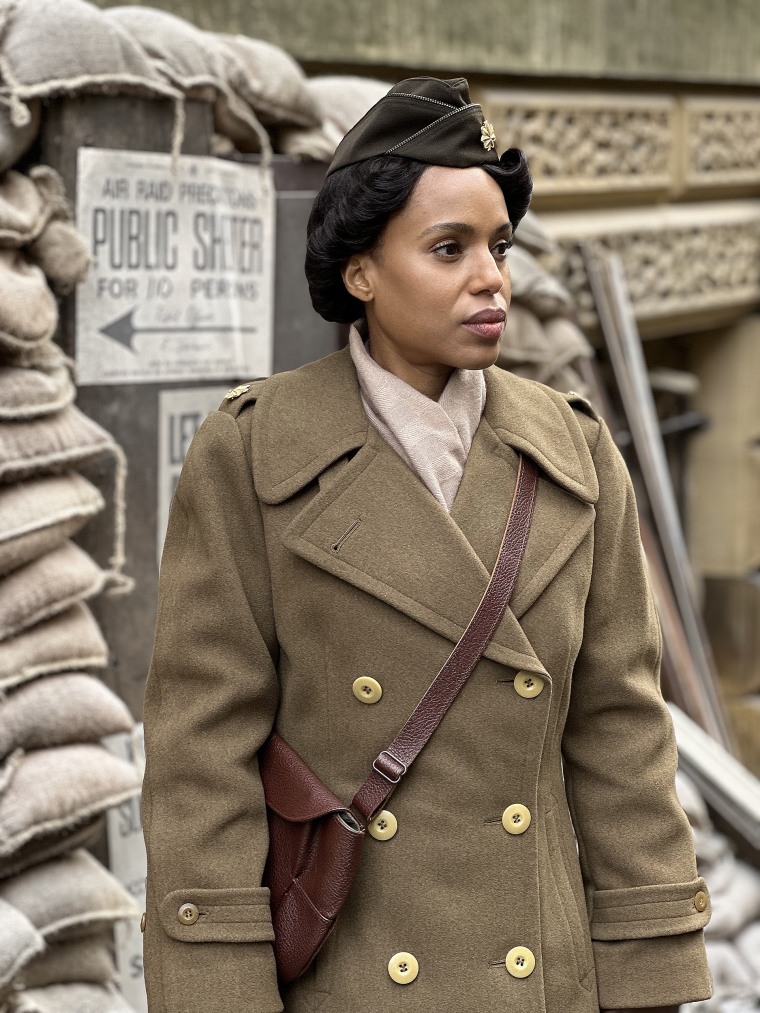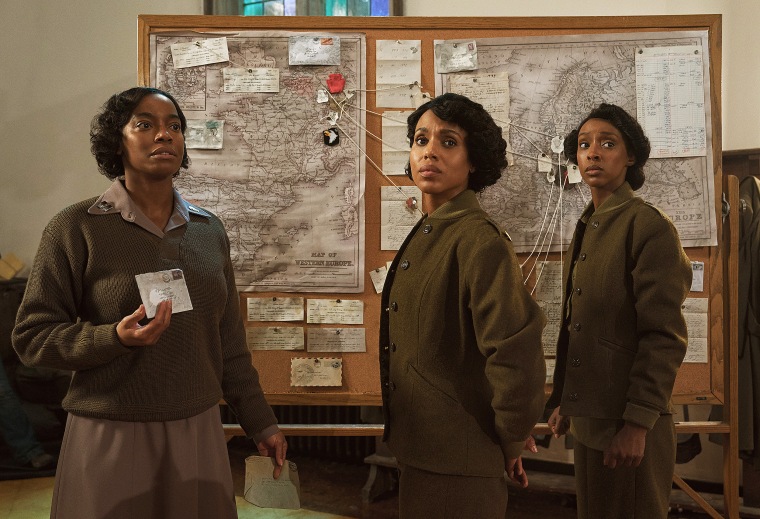Warning: This story contains spoilers for “The Six Triple Eight.”
“No mail, low morale.”
That was the motto of the 6888th, a battalion that made history in World War II as the first and only Women’s Army Corps unit of color to serve overseas.
The heroic efforts of the battalion are captured in Netflix’s “The Six Triple Eight,” written and directed by Tyler Perry and starring Kerry Washington as the battalion’s commander, Major Charity Adams.
The 6888th was tasked with handling a backlog of over 17 million of pieces of mail, an especially important task at a time when letters were the only way soldiers could interact with loved ones.

“They were inspiring the soldiers to keep fighting by getting them the letters from home,” Perry said in the film’s press notes. “When that’s the only way that you can communicate across seas in wartime, it was so important that those soldiers got those letters in their hands. That was life to them.”
Keep reading to learn more about “The Six Triple Eight” and the real-life events that inspired the film, which premieres on Netflix Dec. 20.
Who were the Six Triple Eight?
The Six Triple Eight is a nickname for the 6888th Central Postal Directory Battalion, the only U.S. Women’s Army Corps (WAC) unit of color stationed in Europe during World War II, according to Netflix’s Tudum blog.
The battalion of 855 women were mostly comprised of Black service members, but also included some women of Caribbean and Mexican descent.
In February 1945, the 6888th was tasked with managing a backlog of over 17 million pieces of mail, sorting letters and packages that filled three aircraft hangars.
It was a formidable job, especially given that so many letters were improperly addressed, or addressed to common names like “Robert Smith,” according to the Buffalo Soldier Educational and Historical Committee.

The women devised an efficient system for sorting the mail and worked round-the-clock shifts in Birmingham, England. They had minimal heating despite freezing conditions and, due to the threat of air raids, they worked in aircraft hangars with blacked-out windows, making visibility difficult.
In addition to the physical challenges, they faced racism and misogyny within the Army. According to the battalion’s historical committee, they were not “allowed to sleep, shower or eat in the same facilities as the other female personnel and soldiers.”

The battalion was commanded by Maj. Charity Adams (later Lt. Col. Charity Adams Earley), the first Black woman to serve as an officer in the WAC. By the time the war ended, Adams was the highest-ranking Black woman in the U.S. Army.
The 6888th battalion was given six months to complete their task, but they finished in 90 days. After they completed their mission in England, the battalion was relocated to France.
How accurate is Tyler Perry’s ‘The Six Triple Eight’ movie?
The movie’s protagonists are based on real people from the 6888th. Kerry Washington’s character, Maj. Charity Adams, was based on the battalion’s real-life leader.
Several moments from the movie are taken directly from documented and real-life events. Washington tells TODAY.com that one of those real-life moments was when Adams was confronted by a superior officer who told her he would send a white officer to show her how to run her unit, to which Adams replied, “Over my dead body.”
“There are so many courageous moments that happened in the script that I then read in (Adams’) memoir,” Washington, who serves as an executive producer on the film, says. “I think that was like a wonderful surprise to me, that we really were going to be presenting this story in a way that was so rooted in truth and in their lived experience.”

Washington also shares that similar to the film, Adams was “threatened with being court-martialed.”
“In real life, she was court-martialed,” Washington tells TODAY.com. “But because, as she says to the chaplain (in the film), ‘I’ve learned these laws and rules of the army inside and out,’ she was able to win her court-martial, maintain her status and her position in the army. And she went on to earn multiple degrees on the GI Bill.”
Lena Derriecott King, played by Ebony Obsidian, was also a veteran of the battalion who helped Perry with his research.
“I met her when she was 99 years old. I didn’t know what to expect,” Perry told Hoda on TODAY Dec. 17. “I wanted to ask her about the 6888 before I started writing. When she comes down the stairs — comes down to sit and talk to me, I’m like, ‘Is she going to be in the right mind? Is she OK?'”
Perry said his clear interaction with King quickly washed away all of his concerns. “99 and sharp as a tack. She told me these incredible stories. Her recall and memory was so great that when I ran it by a historian, he was blown away that she could recall that much.”
Perry was able to show King a rough cut of the movie before she died at 100 in January 2024, and the filmmaker said she “loved it.”
“She was saluting the screen. She was laughing. But at the end of it, it was so powerful,” he said, according to Netflix’s Tudum. “She was in tears. She just said, ‘Thank you so much for letting the world know that we contributed.’”
Several other characters in the film are based on real-life figures, including Oprah Winfrey’s character, civil rights activist Mary McLeod Bethune, as well as President Franklin Roosevelt and Eleanor Roosevelt, played by Sam Waterston and Susan Sarandon.
While much of the film closely follows historical events, Perry revealed he did take one creative liberty toward the end of the film, when the entire battalion is applauded and saluted.
“That salute didn’t happen. It didn’t happen until many, many, many years later,” Perry told the audience at a recent screening of the film, attended by TODAY.com.
“So the liberty that I took at the end was having everyone of them be saluted,” he continued. “They all are saluted as they walk in because they represent all 855 to me. And you see them walking through this door into a new life, into a new future.”
What happened to the Six Triple Eight?
The 6888th disbanded in 1946 and did not receive public recognition in the immediate aftermath of World War II. According to Washington, there were even rumors when they returned home that they “were only sent over to be concubines to the Black soldiers.”
“This rumor got started to kind of diminish their legacy,” Washington tells TODAY.com. “So a lot of women when they came back, not only were they not celebrated, but they didn’t talk about what they did.”
In recent years, however, the battalion’s work has been honored on a national level. In 2018, a monument to the 6888th was erected in Leavenworth, Kansas, and in 2022, the battalion was awarded the Congressional Gold Medal. Six of the members from the battalion who were alive at the time received the honor.
In 2023, the U.S. Army also changed the name of the Fort Lee Army base in Virginia to Fort Gregg-Adams, in honor of Lt. Col. Charity Adams and Lt. Gen. Arthur Gregg, the first Black officer in the U.S. Army to reach the rank of lieutenant general.